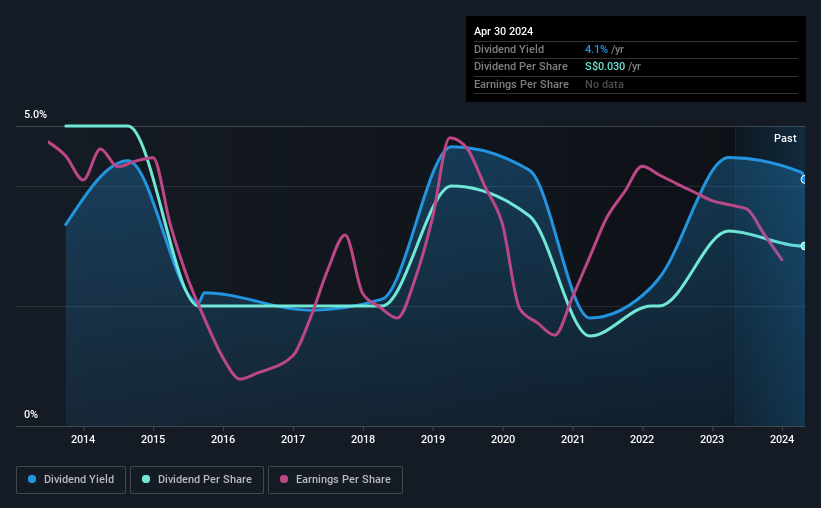Stock Analysis
- Singapore
- /
- Consumer Finance
- /
- SGX:S23
Here's Why We're Wary Of Buying Singapura Finance's (SGX:S23) For Its Upcoming Dividend

Readers hoping to buy Singapura Finance Ltd (SGX:S23) for its dividend will need to make their move shortly, as the stock is about to trade ex-dividend. The ex-dividend date is one business day before a company's record date, which is the date on which the company determines which shareholders are entitled to receive a dividend. It is important to be aware of the ex-dividend date because any trade on the stock needs to have been settled on or before the record date. Thus, you can purchase Singapura Finance's shares before the 3rd of May in order to receive the dividend, which the company will pay on the 10th of May.
The company's next dividend payment will be S$0.03 per share, on the back of last year when the company paid a total of S$0.03 to shareholders. Looking at the last 12 months of distributions, Singapura Finance has a trailing yield of approximately 4.1% on its current stock price of S$0.73. Dividends are an important source of income to many shareholders, but the health of the business is crucial to maintaining those dividends. So we need to check whether the dividend payments are covered, and if earnings are growing.
See our latest analysis for Singapura Finance
If a company pays out more in dividends than it earned, then the dividend might become unsustainable - hardly an ideal situation. Singapura Finance paid out more than half (52%) of its earnings last year, which is a regular payout ratio for most companies.
When a company paid out less in dividends than it earned in profit, this generally suggests its dividend is affordable. The lower the % of its profit that it pays out, the greater the margin of safety for the dividend if the business enters a downturn.
Click here to see how much of its profit Singapura Finance paid out over the last 12 months.

Have Earnings And Dividends Been Growing?
Businesses with shrinking earnings are tricky from a dividend perspective. If earnings fall far enough, the company could be forced to cut its dividend. So we're not too excited that Singapura Finance's earnings are down 4.4% a year over the past five years.
The main way most investors will assess a company's dividend prospects is by checking the historical rate of dividend growth. Singapura Finance's dividend payments per share have declined at 5.0% per year on average over the past 10 years, which is uninspiring. While it's not great that earnings and dividends per share have fallen in recent years, we're encouraged by the fact that management has trimmed the dividend rather than risk over-committing the company in a risky attempt to maintain yields to shareholders.
The Bottom Line
Has Singapura Finance got what it takes to maintain its dividend payments? We're not overly enthused to see Singapura Finance's earnings in retreat at the same time as the company is paying out more than half of its earnings as dividends to shareholders. All things considered, we're not optimistic about its dividend prospects, and would be inclined to leave it on the shelf for now.
With that in mind though, if the poor dividend characteristics of Singapura Finance don't faze you, it's worth being mindful of the risks involved with this business. Every company has risks, and we've spotted 2 warning signs for Singapura Finance you should know about.
If you're in the market for strong dividend payers, we recommend checking our selection of top dividend stocks.
Valuation is complex, but we're helping make it simple.
Find out whether Singapura Finance is potentially over or undervalued by checking out our comprehensive analysis, which includes fair value estimates, risks and warnings, dividends, insider transactions and financial health.
View the Free AnalysisHave feedback on this article? Concerned about the content? Get in touch with us directly. Alternatively, email editorial-team (at) simplywallst.com.
This article by Simply Wall St is general in nature. We provide commentary based on historical data and analyst forecasts only using an unbiased methodology and our articles are not intended to be financial advice. It does not constitute a recommendation to buy or sell any stock, and does not take account of your objectives, or your financial situation. We aim to bring you long-term focused analysis driven by fundamental data. Note that our analysis may not factor in the latest price-sensitive company announcements or qualitative material. Simply Wall St has no position in any stocks mentioned.
About SGX:S23
Mediocre balance sheet second-rate dividend payer.

